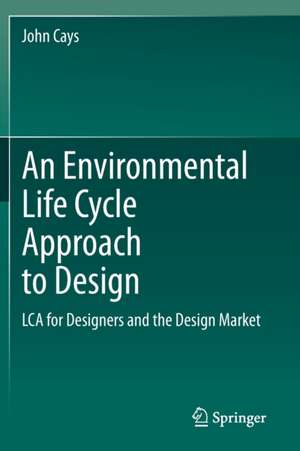An Environmental Life Cycle Approach to Design: LCA for Designers and the Design Market
Autor John Caysen Limba Engleză Paperback – 20 dec 2021
The book analyzes the human desire for consumption, and suggests design innovations for promoting "best practices". LCA tools, data, and methodologies are explained and offered as these potential innovations for affecting positive environmental change. As an underlying component of LCA, the book defines the energy essentials related to environmental problems, and how LCA design solutions must address these factors while also appealing to a designated client-base. The book also teaches designers how to consider corporate incentives for trusting LCA designs, such as investor confidence, loyalty, and consumer trust. The book will appeal to a broad range of designers interested in sustainable and data-driven design, and may be utilized by non-LCA specialists in expanding their design perspectives and goals in the marketplace.
| Toate formatele și edițiile | Preț | Express |
|---|---|---|
| Paperback (1) | 266.54 lei 43-57 zile | |
| Springer International Publishing – 20 dec 2021 | 266.54 lei 43-57 zile | |
| Hardback (1) | 288.80 lei 38-44 zile | |
| Springer International Publishing – 20 dec 2020 | 288.80 lei 38-44 zile |
Preț: 266.54 lei
Nou
Puncte Express: 400
Preț estimativ în valută:
51.01€ • 53.06$ • 42.11£
51.01€ • 53.06$ • 42.11£
Carte tipărită la comandă
Livrare economică 14-28 aprilie
Preluare comenzi: 021 569.72.76
Specificații
ISBN-13: 9783030638047
ISBN-10: 3030638049
Pagini: 216
Ilustrații: XVII, 216 p. 76 illus., 52 illus. in color.
Dimensiuni: 155 x 235 mm
Greutate: 0.34 kg
Ediția:1st ed. 2021
Editura: Springer International Publishing
Colecția Springer
Locul publicării:Cham, Switzerland
ISBN-10: 3030638049
Pagini: 216
Ilustrații: XVII, 216 p. 76 illus., 52 illus. in color.
Dimensiuni: 155 x 235 mm
Greutate: 0.34 kg
Ediția:1st ed. 2021
Editura: Springer International Publishing
Colecția Springer
Locul publicării:Cham, Switzerland
Cuprins
Chapter1. Do Nothing: The Danger of Believing in a World without Limits.- Chapter2. The Energy Essential: Physical Forces Animate All Things.- Chapter3. Trash Can Living.- Chapter4. Do Something: Mid-Twentieth Century Developments.- Chapter5. Life Cycle Assessment.- Chapter6. Addressing Resistance to a Fact-Based Approach.- Chapter7. LCI Data and Design.- Chapter8. Dashboard.- Chapter9. Case Studies.
Notă biografică
John Cays is Associate Dean for Academic Affairs and Interim Director of the School of Art + Design in the New Jersey Institute of Technology’s J. Robert and Barbara A. Hillier College of Architecture and Design. He is a licensed professional architect. He holds a Bachelor of Science in Architecture from the University of the Arts and Master of Architecture degree from Princeton University.
Prior to co-founding GRADE Architects, an architecture and interior design firm in NYC in 2001, he was a project manager at Robert A.M. Stern Architects. Since 2005 he has been responsible for overseeing the development and use of “Kepler,” NJIT’s transparent digital repository, and qualitative data driven course management and curricular assessment system. In 2008, Kepler served as the engine behind the nation's first fully digital NAAB accreditation visit. He served as North East Regional Director for the Association of Collegiate Schools of Architecture from 2014 – 2017 and as a Director on the National Architectural Accrediting Board from 2017 – 2020. His research focuses on visualization, translation, and advocacy to increase the adoption and use of quantitative Life Cycle Assessment methods and tools in the design fields.
Prior to co-founding GRADE Architects, an architecture and interior design firm in NYC in 2001, he was a project manager at Robert A.M. Stern Architects. Since 2005 he has been responsible for overseeing the development and use of “Kepler,” NJIT’s transparent digital repository, and qualitative data driven course management and curricular assessment system. In 2008, Kepler served as the engine behind the nation's first fully digital NAAB accreditation visit. He served as North East Regional Director for the Association of Collegiate Schools of Architecture from 2014 – 2017 and as a Director on the National Architectural Accrediting Board from 2017 – 2020. His research focuses on visualization, translation, and advocacy to increase the adoption and use of quantitative Life Cycle Assessment methods and tools in the design fields.
Textul de pe ultima copertă
This book introduces readers to Life Cycle Approach (LCA)-supported design solutions, through non-geometric-data-driven methodologies, to provide a clear picture of how to optimize individual designs in addressing ecological challenges. By offering LCA, the book gives designers a complimentary set of science-based perspectives and techniques with a focus on high data quality for clarity and public accessibility. While most design solutions and resources are meant to appeal to people by solving everyday problems, this book uses LCA designs to appeal to people through a combination of practicality, accuracy, and the need to decelerate ecological destruction through products offered to marketplace consumers. In essence, the book teaches designers how to craft environmentally responsive designs for their clients at little to no extra cost, but with necessary ecological benefits.
The book analyzes the human desire for consumption, and suggests design innovations for promoting "best practices". LCA tools, data, and methodologies are explained and offered as these potential innovations for affecting positive environmental change. As an underlying component of LCA, the book defines the energy essentials related to environmental problems, and how LCA design solutions must address these factors while also appealing to a designated client-base. The book also teaches designers how to consider corporate incentives for trusting LCA designs, such as investor confidence, loyalty, and consumer trust. The book will appeal to a broad range of designers interested in sustainable and data-driven design, and may be utilized by non-LCA specialists in expanding their design perspectives and goals in the marketplace.
Caracteristici
Discusses Life Cycle Approach (LCA) for designers to address environmental challenges through data-driven techniques Introduces readers to LCA-supported design solutions for ecological improvement Develops data quality improvement methodologies to affect positive environmental change
